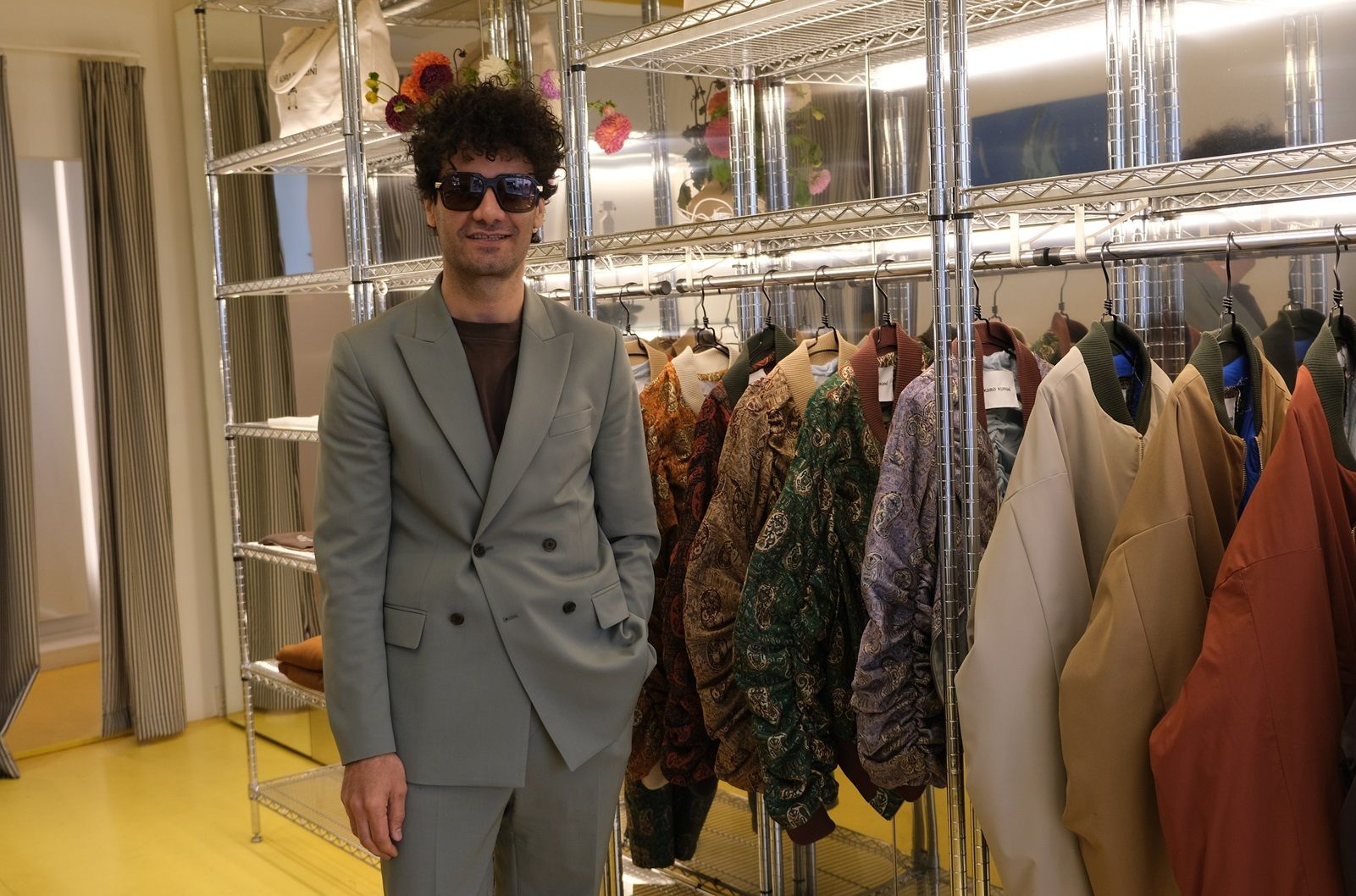“I’ve always appreciated craft and design. All my ancestors, going back maybe 300 or 400 years, are Persian carpet-makers,” says Karo Kurrani, as he opens the glass door to his small, bright showroom on a cobbled back-street in Copenhagen’s city centre.
Kurrani is an Iranian fashion designer and part of the new guard of creatives in Denmark. But his work is unusual: it’s rare to encounter such deeply-rooted craft lineage on the emerging fashion circuit, where the pace of trends is high and newfangled methods attract exposure.
“I grew up working with fabric by hand, which shaped my understanding of the power of aesthetics and inspired me to create these immersive fashion environments,” he continues, closing the door behind us and gesturing for us to sit on a bench beside a display of painted ceramics and plush folded shirts in apricot brown and plum blue.
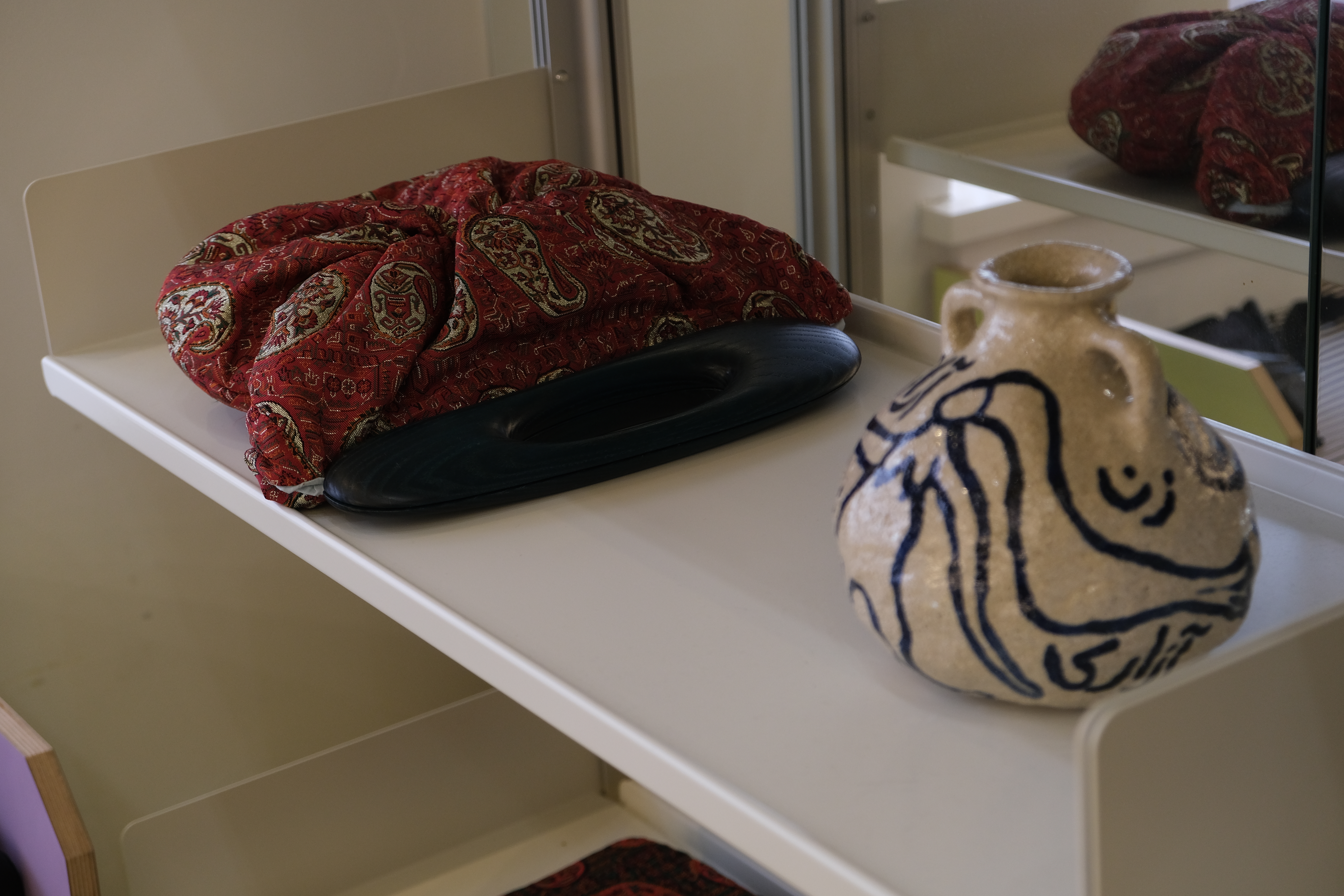
The showroom, a space run by the renowned Danish designer Mads Nørregaard, is Kurrani’s for just a month, but it has already achieved the feel of a flagship store.
“I had always wanted to make a label under my own name, but I was afraid I wouldn’t do it justice,” continues Kurrani, sitting down too. He’s wearing a light-grey, double-breasted suit over a coffee-coloured crew neck, and his face is framed by big black sunglasses and dark curls.
“It took me some time to find out what I wanted to say – but I finally made KARO KURRANI in 2022.”
As it transpired, ‘saying something’ became the signature concept of the brand; each of Kurrani’s small capsule collections is a self-contained social commentary.
The first was a comment on Gen Z. The second, he recounts, was about “how we think of the future but totally forget the present”. Then came a collection about dream interpretation, based on Carl Jung’s psychology.
“I look at what’s going on in society and find my subject first, then I ask ‘what does this inspire me to do? How will I use visual storytelling to communicate that in fashion?’” explains Kurrani.

Woman, Life, Freedom
A pause intercedes as we drink in the colours and patterns of the garments around us. They are from Kurrani’s latest capsule 7th Wave, a collection dedicated to Woman, Life, Freedom – Iran’s strongest freedom movement since the clerical regime came to power.
The movement erupted when a young woman, Jina Mahsa Amini, was killed in police custody after being arrested for opposing the mandatory hijab in Tehran in September 2022.
Her death sparked outrage and protests in Iran and abroad – and is still resounding today. I point out one of Kurrani’s jumpers hanging opposite, embroidered with Amini’s portrait.
“Yes, that’s Jina. It’s because of her that our revolution has begun. It’s important for me to pay tribute in 7th Wave,” he says soberly.
“Let me explain. Since 1906, we have had seven freedom movements in Iran. Woman, Life, Freedom is number seven. Meanwhile, there is this ocean lore that waves come in sets, but that the last wave, the seventh wave, is the biggest. Woman, Life Freedom – the seventh wave, the strongest movement,” he says, standing up and beginning to lead me through the garments, pausing over each.
There are slouchy bomber jackets with ruched sleeves, loose fit pants, pillowy clutch bags whose soft, round form blooms from a sculpted wooden handle. The fabric is rich green, purple and blue – lustrous and intricately patterned.
Kurrani lifts a deep mauve bomber jacket off the line and turns it slowly in the air.
“This fabric is called Termeh. It has been made by Iranians for almost 1000 years. And this pattern is called Boteh Jehgeh – it is one of the oldest Iranian motifs that has spread all over the world,” he says, and he unzips the chest to show a duck-egg blue lining.
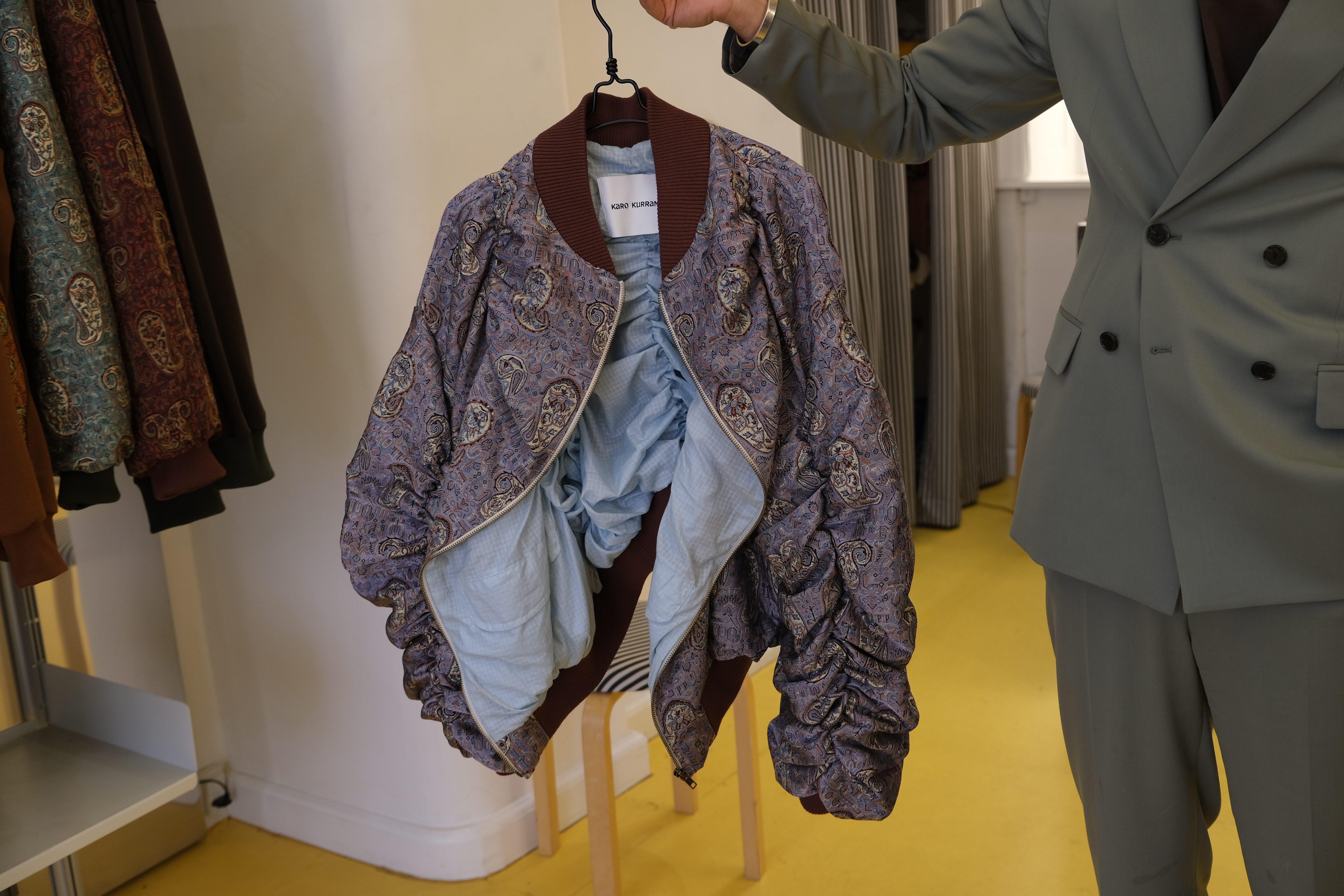
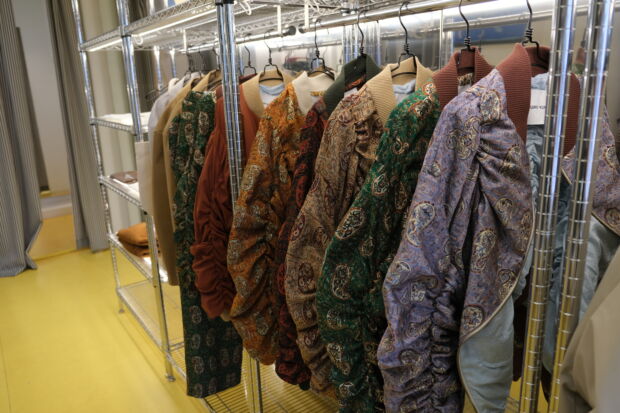
“Normally it’s made from silk, and it’s a very expensive 16-thread fabric. It’s used sparingly in luxury interior design pieces – on the couch, the wall, the coffee table.”
But Kurrani’s version of Termeh uses silk-viscosa, a blend whose quality emulates pure silk, without the price tag.
“What made me want to do that? No one was using this fabric in fashion. Perhaps for very small details, but not to make a whole piece. I wanted to pay tribute to the fabric, to the tradition – to lift it up and show that it can also work in fashion,” he says.
“All through the collection are the waves. On this jacket, it’s in what I call its more postmodern shape, and in all these folds,” he says, indicating the drop shoulders and overlong, ruched sleeves.
“The long arms represent the heavy hands of the activist who works all the time,” he adds, and flashes an inside-joke smile.
Fashion as activism
Kurrani’s drive for activism is more than just a tribute – it’s personal. Like many young Iranians in Europe, he is a political refugee. He came to Denmark aged 24, during the Iranian Green Movement protests of 2009.
“90 percent of Iran joined that revolution. We demonstrated against the regime, and people were shot on the street. Suddenly it became a big thing. It was violent. People were killed, imprisoned, deported. I was one of those who fled from Iran,” he says.
“You lose and you gain. I’ve lost my family, my country, my city – and I still haven’t paid as big a price as those who really paid, and continue to pay.”

Kurrani debuted 7th Wave on International Women’s Day, March 8 2023, at Andersens Galleri in Copenhagen, alongside an exhibition about Women, Life, Freedom by the renowned Iranian visual artist Farshad Farzankia.
“Farshad is a friend of mine, and he inspired me a lot,” says Kurrani. “He and I had talked about how our works spoke to one another. In fashion, I mix tradition and craftsmanship with contemporary art. That’s the DNA of the label. So we thought we could do it together.”
The Woman, Life, Freedom demonstrations that followed Amini’s death the year before had not only raised awareness amongst Danes, but galvanised the Iranian community and forged connections between Danes and Iranians in Copenhagen.
“I’ve met a lot of Iranians who said they hadn’t met other Iranians in Denmark until Woman, Life Freedom. Because of that movement, they gathered together and got to know each other. We also get a lot of support from the Danish community. All of that has given us momentum,” says Kurrani.
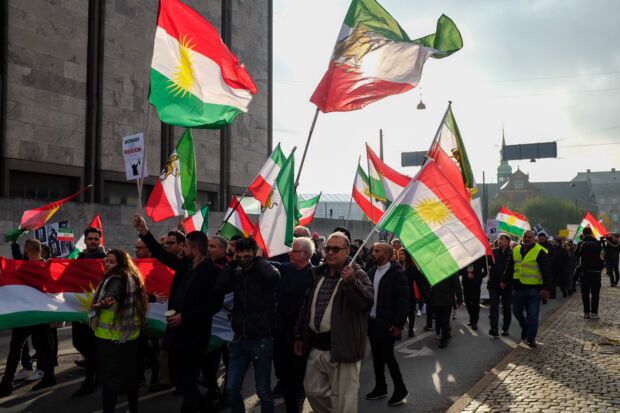
“Iranians get the job done”
And the 7th Wave collection exerted its own snowball-effect of unification amongst Persians in Copenhagen.
To start with, everyone on the production team was Iranian. “It made sense to pick Iranians – they get the job done,” Kurrani says, grinning.
But they did more than just get the job done; they drew the attention of the Danish media DR, who included Kurrani and 7th Wave in the documentary Iran i Hjertet (Iran in my Heart), released in September 2023 to mark the anniversary of Amini’s death.
The film – which platforms four young Iranian creatives in Copenhagen active in the women’s freedom movement – became a crucial channel for Woman, Life, Freedom to reach a mainstream Danish audience, and turned Kurrani into a beacon of activism in Copenhagen’s fashion scene.
A new flavour of design in Denmark
It would be wide of the mark to describe KARO KURRANI as an Iranian brand, however.
The label is deeply influenced by Kurrani’s arts schooling at VIA Designskole in Herning, as well as his studies in computer technology and pilot training in Roskilde. Meanwhile, it draws liberally on references from philosophy, the global digital age, and Danish social conditions.
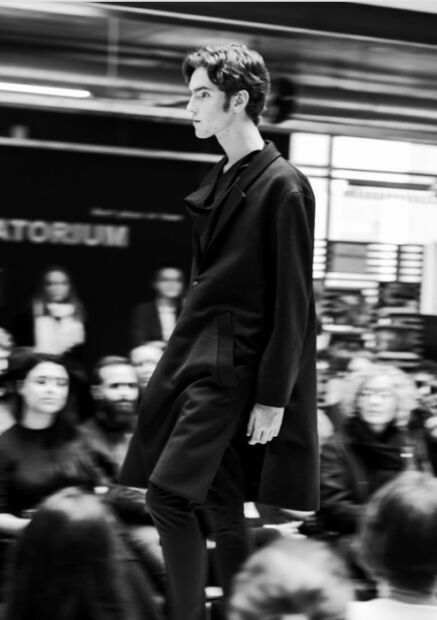
In 2018, he was one of 25 chosen for the DESIGNER’S NEST Award, which recognises emerging Scandinavian design talent, and Kurrani calls the various cultures and countries he reflects in his work ‘influences for life’.
“I’m based in Copenhagen and I like Scandinavian design. It’s minimal, simple, functional and useful. I just thought ‘I’ll put a little curry into it.’”
While it’s still early-stage, his next capsule will explore the idea of integration and immigration – a subject that attracts lively debate in Denmark. Perhaps Kurrani’s will be the first fashion-based commentary on the matter.
“I’m going to get a birds eye view of the topic to get perspective on it. I’m not holding myself to any particular side of the argument,” he says.
“I’m open to whatever I observe. I always think about people and I always stay true to my values of empathy and courage. That’s the most important thing for me.”

